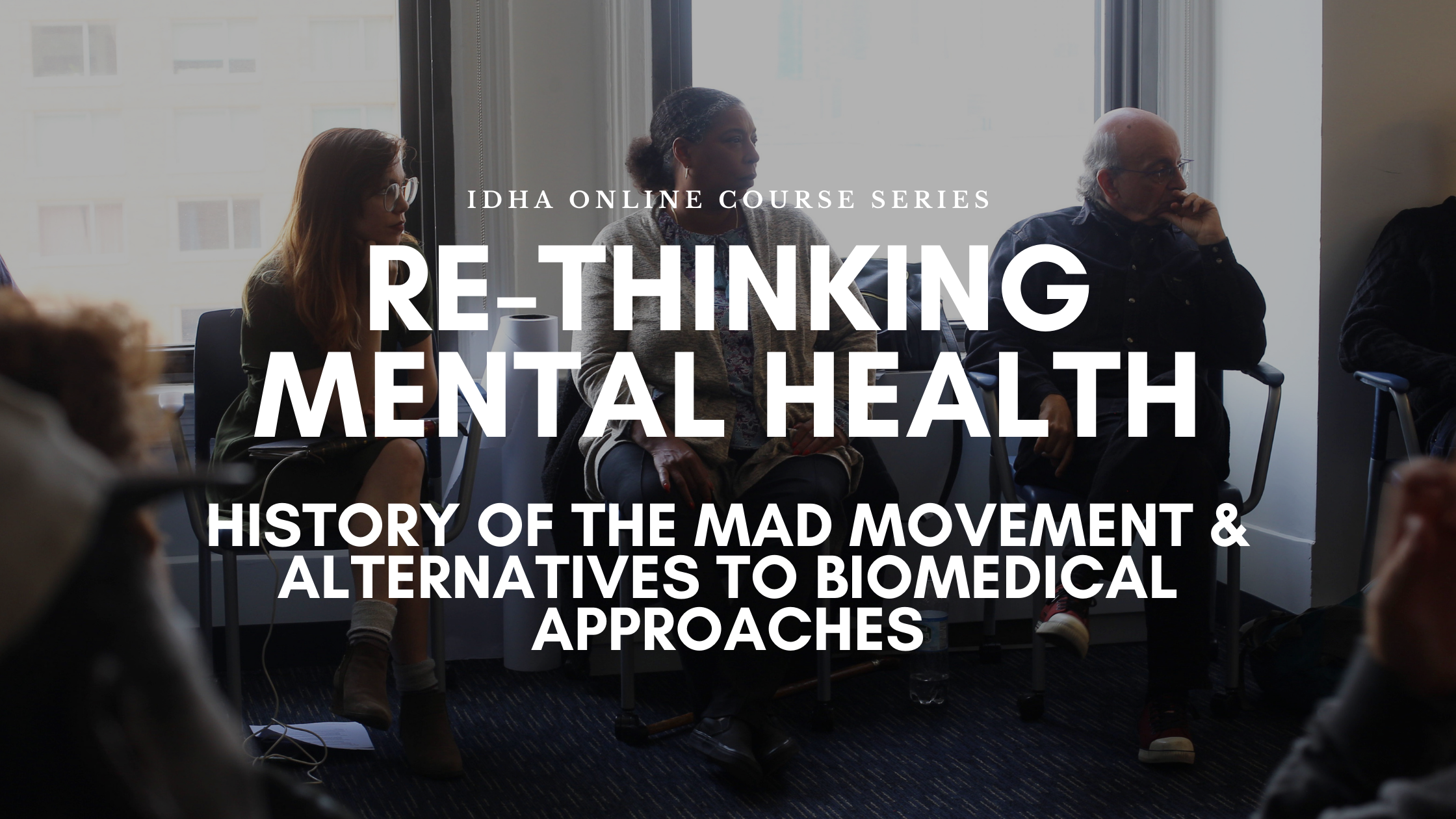Train With Me
I partner with organizations, communities, and groups to deliver insightful trainings on transformative mental health and mind–body healing.
Grounded in liberatory mental health models, my work is shaped by both lived experience and professional expertise as a:
Former mental health worker
Mad studies & neuroscience scholar
Co-founder of an international mental health training institute
Survivor of complex trauma, autoimmunity, and mental health challenges
I draw on diverse models and interdisciplinary frameworks to bring depth, nuance, and practical tools to a wide range of audiences
Signature Topics:
Transformative & Liberatory Mental Health – Moving beyond traditional psychiatric models, symptom management, and diagnostic tools, to systemic, holistic change.
Mind–Body Connection – Understanding the science and philosophy of how body, mind, and society shape one another.
Healing Complex Trauma – Embodied, compassionate, and integrative approaches to working with personal and collective trauma.
Embodied, Ancestral & Intuitive Practices – Pathways for emotional release and self-connection rooted in ancient practices and somatic awareness.
Psychosis & Spiritual Integration – Uncovering root causes of psychosis across domains and integrating altered states with safety, meaning, and care.
Primary Audiences:
Mental health professionals, clinicians, and peer providers.
Activists, community organizers, academics, and educators.
Non—profit organizations, startups, and international projects
I offer keynotes, workshops, and interactive trainings tailored to your community’s needs, in person and online.
Recent Trainings & Speaking Engagements:
Young Peacebuilders Program – Collective Leadership Institute — Potsdam, Germany, Aug-Oct, 2025
Embodied Practices for Inner Transformation
Embracing Multiplicity and Aligning Our Values
Somatic Parts Work: Resolving Inner Conflict
Anti-Carceral Crisis Care: Cultivating Agency and Self-Determination for Those Experiencing Altered States, International Society for Psychological and Social Approaches to Psychosis – US Chapter, Annual Conference — Nov 3, 2024 (with J. Roth & N. Gokul)
Mad Studies Reader: Interdisciplinary Innovations in Mental Health – Meet the Author
International Society for Social and Psychological Approaches to Psychosis, Annual Conference — Helsinki, FL, Jun 8, 2024Transformative Mental Health Core Curriculum, Institute for the Development of Human Arts (IDHA). Lessons taught: Division in the Field Of Psychiatry, A Transformative View of Mental Health Experiences, Being With Experiences Labeled Psychosis, Mental Health and Chronic Illness, Integrating a Transformative Lens: Putting It Into Practice
Creating a Crisis Toolkit: Reconciling Personal Values with Professional Ethics, Institute for the Development of Human Arts (IDHA) — Apr 16, 2023 (with T. Gatta)
Practicing Transformative Mental Health, Partners for Justice — Online, Jan 20, 2021 (with J. Roth)
Vision for Transformative Mental Health, Yale Program for Recovery and Community Health, Oct 27, 2020 (with J. Roth)
Altered States & Deep Emotional Processing, ISPS-US Annual Conference — New York, NY, Nov 3, 2019
Transformative Mental Health, Open Society Foundations — New York, NY, Oct 18, 2019 (with J. Bossewitch)
Making Meaning from Visions & Voices: Supporting People Through Altered States
Experience Transforms Practice, IDHA — New York, NY, Dec 1, 2018 (with K. Michelle & N. Jones)Alternatives to Biomedical Approaches
Experience Transforms Practice, IDHA — New York, NY, Oct 20, 2018 (panel with J. Bossewitch et al.)Mental Health Trialogue: Perspectives from Family Members, Prescribers & Peers
RebPsych Conference — New Haven, CT, Sep 28, 2018 (with X. Chen & J. Roth)Peer Workers as Change Agents: Building Our Collective Power
12th Annual Peer Workers Conference, NYU — New York, NY, Jul 28, 2018 (with A. Serrano et al.)
Online Self-Study Trainings
This curriculum was build by the Institute for the Development of Human Arts with over 50 mental health experts from around the globe.
You’ll find me in the following lessons:
Founding History of IDHA with Dr. Peter Stastny
Division in the Field (Of Psychiatry)
A Transformative View of Mental Health Experiences
Being With Experiences Labeled Psychosis
Mental Health and Chronic Illness
Integrating a Transformative Mental Health Lens: Putting it Into Practice
What You’ll Learn
IDHA’s Transformative Mental Health Core Curriculum draws upon knowledge and traditions across a range of disciplines, social movements, geographies, and perspectives to advance approaches to mental health care rooted in humanity, care, and support.
Over the course of eight modules, you will be introduced to asystemic, historical analysis of mental health, including how racism, ableism, and other forms of oppression intersect with mental health;diverse narratives of lived experienceand the powerful impact of grassroots movements, past and present; a variety ofcommunity-based and peer-led practicesthat support healing; and atransformative mental health lensand how to apply it to your life and work.
What you’ll learn:
How power dynamics play out within helping relationships
The ways in which professional and non-professional helpers can be complicit in causing harm
How to identify personal values in order to create a personal ethical framework that can be mobilized in daily life and work
Intentional strategies for allyship in helping relationships
Self-preservation rituals to resist burnout
COURSE DESCRIPTION:
Cultures of professionalism in mental health are upheld and maintained through standardized codes of ethics. While these frameworks can aid swift decision making in times of supposed emergency, they can also reinforce cultures of liability that restrict the rights and autonomy of those experiencing distress. In the case of mandated reporting, for example, disclosure of suicidality can lead to forced treatment; although this may guarantee a temporary reprieve for a person in crisis, such measures have also been shown to exacerbate the problems they purport to solve. For those of us who are often caught between personal value systems and the codes of ethics from our fields, these experiences can also leave behind a trail of moral injury.
Taught by: Jazmine Russell, Celia Brown, Issa Ibrahim, Sascha Altman DuBrul, Bradley Lewis, and Jonah Bossewitch as part of The Institute for the Development of Human Arts’ School for Transformative Mental Health
What you get
Access to an online portal to take the self-paced online class
7 videos full of history, research, and unique perspectives (80 minutes of content)
3 bonus articles written by our faculty and other leaders in the field
Discussion with a creative community of professionals and advocates inside the course
A reference and resource list to aid ongoing learning and exploration on the course topics
What you’ll learn
An overview of the political and social landscape that bolstered the biopsychiatric model from the 1980s until now
The widespread impacts of big pharma, the marketing of psychotropic medication, and cultural reforms in response
Alternative frameworks for understanding mental health (e.g. social, trauma-informed, and generative)
A brief history of the mad movement and human rights reform in mental health
The power of lived experience and listening to the voices of survivors of trauma and adversity






